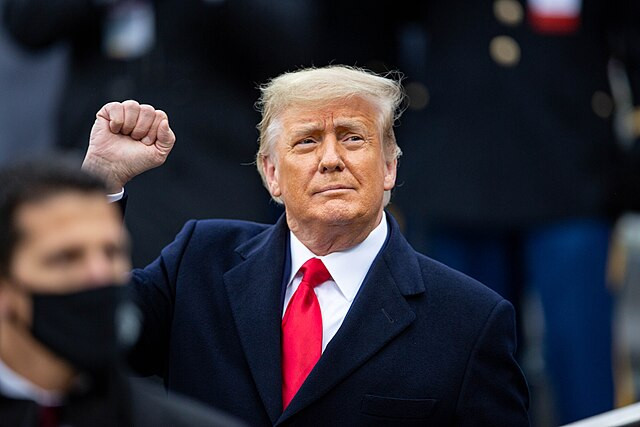Former President Donald Trump is once again under fire for his controversial remarks, this time suggesting that undocumented immigrants who commit crimes have "bad genes." During a recent interview on "The Hugh Hewitt Show," Trump veered into contentious territory as he linked criminal behavior to genetic factors, sparking backlash from political leaders and civil rights groups who argue that his comments echo dangerous ideologies.
Trump, targeting Vice President Kamala Harris over her handling of immigration issues, claimed that the U.S. is facing an influx of criminals due to what he described as an "open border" policy. He asserted, "How about allowing people to come through an open border, 13,000 of which were murderers? Many of them murdered far more than one person. And they're now happily living in the United States. You know, now a murderer - I believe this: it's in their genes. And we got a lot of bad genes in our country right now."
These remarks mark a continuation of Trump's use of inflammatory rhetoric on immigration, a central issue in his 2024 campaign. Trump's language, framing immigration in terms of genetic inferiority, has drawn criticism for its echoes of eugenic theories, concepts that have historically been used to justify exclusionary and discriminatory policies. His previous statements, including his claim that undocumented immigrants are "poisoning the blood of our country," have only intensified the debate over the implications of such language.
The Trump campaign responded to the criticism by clarifying that his comments were directed specifically at criminals, not immigrants in general. Karoline Leavitt, the campaign's national press secretary, said, "He was clearly referring to murderers, not migrants. It's pretty disgusting the media is always so quick to defend murderers, rapists, and illegal criminals if it means writing a bad headline about President Trump."
Despite the campaign's attempt to steer the narrative, the backlash against Trump's comments has been swift and fierce. White House Press Secretary Karine Jean-Pierre condemned the former president's remarks, calling them "hateful, disgusting, and inappropriate." She emphasized that such rhetoric has no place in American political discourse, highlighting the Biden administration's focus on promoting unity and rejecting divisive language.
Fact-checkers have also weighed in, pointing out that Trump's claim about 13,000 murderers entering the U.S. is misleading. Data from U.S. Immigration and Customs Enforcement (ICE) shows that the number includes individuals with criminal records spanning several decades, not just recent arrivals. The Department of Homeland Security clarified that these statistics reflect a broad spectrum of cases, many dating back to Trump's own tenure in the White House, and do not necessarily correlate with the current state of immigration enforcement.
Trump's rhetoric has a long history of painting immigrants as dangerous and undesirable. During his presidency, he infamously referred to some immigrants as "animals" and suggested that they spread diseases. His latest comments about genetic predisposition to crime have only deepened concerns that he is using immigration to sow fear and division, a strategy that has become a hallmark of his political playbook.
The broader political landscape is also reacting to Trump's remarks. Vice President Kamala Harris has made immigration reform a focal point of her campaign, advocating for policies that balance border security with humane treatment for migrants. Her response to Trump's statements has been more measured, with her campaign team declining to comment directly on the matter. However, her allies have been quick to criticize what they see as Trump's attempt to dehumanize entire groups of people for political gain.
Trump's focus on genetics is not new. In 2020, he praised his supporters in Minnesota by telling them, "You have good genes. A lot of it is about the genes, isn't it, don't you believe?" Such remarks have been interpreted as a nod to eugenic concepts, raising alarms among civil rights groups about the implications of this rhetoric in contemporary politics.
As Trump gears up for the 2024 election, his renewed focus on immigration is expected to play a central role in his campaign strategy. He has vowed to conduct the largest deportation operation in U.S. history if re-elected, positioning himself as the candidate who will take the toughest stance on border control. His rhetoric on this issue appears aimed at mobilizing his base, even as it risks alienating moderate voters who may find his language too extreme.
Civil rights organizations and advocacy groups continue to voice their concerns over Trump's inflammatory statements. Monica Simpson, executive director of SisterSong Women of Color Reproductive Justice Collaborative, said, "Statements like these not only reinforce harmful stereotypes but also embolden xenophobic attitudes. It's shameful to use such rhetoric for political gain instead of advocating for the safety and dignity of all individuals."






